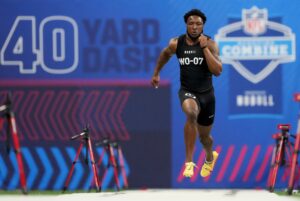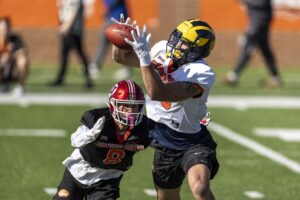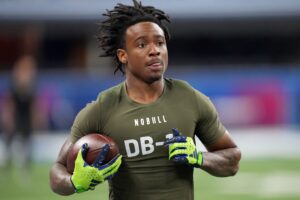2020 has been quite a year, to say the least, and with a lack of sports, we’ve had to find ways to fill the sports void. Piggybacking off the Project G.O.A.T. challenge created by ESPN’s Pierre Becquey, I wanted to do something similar for football with friends to have some fun. We decided to hold an All-Time Fantasy Football Draft to see who could draft the best team.
Fantasy Football All-Time Draft
The Rules
Each team was required to draft two quarterbacks, two running backs, three wide receivers, one tight end, and two flex spots that could be any position besides quarterback. Once a player was drafted, all of that player’s seasons were now ineligible to be drafted, ensuring there would be no overlapping players. Any season from 1990 through 2019 would be eligible to be drafted. I kept track of both total points as well as points per game to give drafters multiple strategies in terms of how to draft. I drew the eighth overall pick, and, for reference, my picks are italicized. Keep in mind these are all based on full PPR fantasy points pulled from Pro Football Reference. Before diving into the draft itself, here’s a look at the group of degenerates I was able to round up for this event.
The Draft Order
1. Nick Norton – @N_Norton1
2. Steve Garn – @Garnold_Palmer
3. Blake Bruce – @Blake_Bruce
4. Josh Jacobs – @MisterRidic
5. Matt Niskey – @Niskey87
6. Ryan Marquis – @Ryan_Kent
7. Grant Nagy – @NagyGrant
8. Rob Norton – @norton0723
9. Bryan Trego – @bryantrego
10. Aaron Grimmett – @GrimDelaGrim41
11. Brandon Fraley – @BFrayy
12. Bob Georgevich
The Draft
1.01 LaDainian Tomlinson (2006) – 481.1 points (30.07)
1.02 Christian McCaffrey (2019) – 471.2 points (29.45)
1.03 Marshall Faulk (2000) – 459.9 points (32.85)
1.04 Priest Holmes (2002) – 440.7 points (31.48)
1.05 Lamar Jackson (2019) – 415.7 points (27.71)
1.06 Patrick Mahomes (2018) – 417.1 points (26.07)
1.07 Peyton Manning (2013) – 412 points (25.75)
1.08 Jerry Rice (1995) – 414 points (25.88)
1.09 Steven Jackson (2006) – 415.4 points (25.96)
1.10 Chris Johnson (2009) – 392.9 points (24.56)
1.11 Aaron Rodgers (2011) – 397.4 points (26.49)
1.12 Emmitt Smith (1995) – 414.8 points (25.93)
The first four picks went exactly as expected as there’s a clear top four here. I was a little surprised to see the run on quarterbacks, but I wasn’t complaining. Not only did I take the first wide receiver, but also the first player season from the ’90s when I selected most people’s G.O.A.T., Jerry Rice. Rice was insane in 1995 as he compiled 122 catches, 1,848 yards, and 15 touchdowns, which was even more incredible when you take into account he was 33 years old that season. Rice was my favorite pick after those clear top four as the drop off between him and the next wide receiver (Antonio Brown) was the largest gap outside of Gronk at tight end, who I thought I may be able to grab at my next pick.
Second Round
2.01 Edgerrin James (2000) – 395.3 points (24.71)
2.02 Rob Gronkowski (2011) – 330.9 points (20.68)
2.03 Arian Foster (2010) – 392 points (24.5)
2.04 Drew Brees (2011) – 393.6 points (24.6)
2.05 David Johnson (2016) – 407.8 points (25.49)
2.06 Ahman Green (2003) – 385 points (24.06)
2.07 Saquon Barkley (2018) – 385.8 points (24.11)
2.08 Todd Gurley (2018) – 372.1 points (26.58)
2.09 Antonio Brown (2015) – 388.2 points (24.26)
2.10 Randy Moss (2007) – 385.3 points (24.08)
2.11 Tom Brady (2007) – 390 points (24.38)
2.12 Cam Newton (2015) – 389.1 points (24.32)
Narrator: I was not able to grab Gronk as my second-round pick. Unfortunately, my plan didn’t go as expected as Gronk was taken a few picks before my pick, so I decided to pivot and take my first running back in David Johnson. Johnson had an incredible year in 2016 putting up more than 2,100 total yards, 20 total touchdowns which included 80 receptions. Johnson is one of only five running backs in NFL history to ever post 1,200+ rushing yards and 800+ rushing yards in the same season. I was surprised to see him still available considering Chris Johnson, Edgerrin James, and Arian Foster were all selected before him despite fewer points scored. For me, he was the easy pick as the only remaining 400-point scorer left on the board and the biggest drop off in terms of the next best player at the position.
Third Round
3.01 Jimmy Graham (2013) – 303.5 points (18.97)
3.02 Terrell Davis (1998) – 381.5 points (23.84)
3.03 Travis Kelce (2018) – 294.6 points (18.41)
3.04 Daunte Culpepper (2004) – 371.3 points (23.21)
3.05 Marvin Harrison (2002) – 384.2 points (24.01)
3.06 Isaac Bruce (1995) – 376.8 points (23.55)
3.07 Shaun Alexander (2005) – 376.8 points (23.55)
3.08 Jamaal Charles (2013) – 378 points (25.2)
3.09 Brian Westbrook (2007) – 368.4 points (24.56)
3.10 Julio Jones (2015) – 375.1 points (23.44)
3.11 Le’Veon Bell (2016) – 317.4 points (26.45)
3.12 Michael Thomas (2019) – 374.6 points (23.41)
Heading into the third round, I was hoping either Graham or Kelce would drop to me because after those two, there was a 14 point drop to Zach Ertz and the tight end group was pretty jumbled from that point with not much of a differential. Unfortunately, my plans were foiled again when they both went in the first three picks. After they went, my sights were set on Jamaal Charles or Shaun Alexander and I was able to select Charles. Charles’ 2013 was one for the books as he compiled just under 2,000 total yards, 19 total touchdowns, and included 70 receptions in 15 games.
Fourth Round
4.01 Herman Moore (1995) – 371.6 points (23.23)
4.02 Michael Vick (2010) – 310.3 points (25.86)
4.03 Cris Carter (1995) – 361.1 points (22.57)
4.04 Steve Young (1998) – 364.2 points (24.28)
4.05 Calvin Johnson (2011) – 359.2 points (22.45)
4.06 Torry Holt (2003) – 359.1 points (22.44)
4.07 Ricky Williams (2002) – 362.6 points (22.66)
4.08 Randall Cunningham (1990) – 347.8 points (21.74)
4.09 Ray Rice (2011) – 372.8 points (23.3)
4.10 Larry Johnson (2006) – 370.9 points (23.18)
4.11 Tiki Barber (2005) – 359 points (22.44)
4.12 Alvin Kamara (2018) – 354.2 points (23.61)
Having already drafted two running backs and one wide receiver, and with there being a big bunching of tight ends and quarterbacks, my sights were set on grabbing my second wide receiver in the fourth round. I had my fingers crossed hoping people would steer towards other positions and allow one of Julio Jones, Michael Thomas, or Herman Moore to drop to me as that would give me a nice boost but that didn’t happen and I was able to grab Calvin Johnson. Megatron’s 2011 season was amazing as he was able to post 96 receptions, 1,681 yards, and 16 touchdowns! Just as a side note, had he not fallen off so steeply in touchdown production the following year, his 2012 season would have been even better and he would have been drafted much earlier.
Fifth Round
5.01 Demaryius Thomas (2014) – 340.9 points (21.31)
5.02 Brandon Marshall (2015) – 339.2 points (21.2)
5.03 Matt Ryan (2018) – 355 points (22.19)
5.04 Steve Smith (2005) – 337.8 points (21.11)
5.05 Barry Sanders (1997) – 348.8 points (21.8)
5.06 Wes Welker (2011) – 335.9 points (20.99)
5.07 Hines Ward (2002) – 337.1 points (21.07)
5.08 Andrew Luck (2014) – 351.7 points (21.98)
5.09 Clinton Portis (2003) – 312.5 points (24.04)
5.10 Russell Wilson (2017) – 347.9 points (21.75)
5.11 Thurman Thomas (1991) – 332.8 points (22.19)
5.12 Matthew Stafford (2011) – 343.3 points (21.46)
Looking towards the fifth round, my team is very balanced, and I’m open to any position at this point and just looking to take the best player available based on the biggest drop off between players available. My choice came down to either Andrew Luck or DeMarco Murray. I decided to take Luck as I felt the difference at quarterback would be more significant. Luck was good as soon as he entered the NFL in 2012 but had a breakout in 2014 as he was able to pass for 4,761 yards and 40 touchdowns while also adding another 273 yards and three touchdowns on the ground.
Sixth Round
6.01 DeMarco Murray (2014) – 351.1 points (21.94)
6.02 Davante Adams (2018) – 329.6 points (21.97)
6.03 Matt Forte (2014) – 346.6 points (21.66)
6.04 Terrell Owens (2002) – 321.9 points (22.99)
6.05 Adrian Peterson (2012) – 347.4 points (21.71)
6.06 DeAndre Hopkins (2018) – 333.5 points (20.84)
6.07 Jamal Anderson (1998) – 337.5 points (21.09)
6.08 Sterling Sharpe (1992) – 330.9 points (20.68)
6.09 Zach Ertz (2018) – 280.3 points (17.52)
6.10 Tyreek Hill (2018) – 334 points (20.88)
6.11 Dallas Clark (2009) – 271.7 points (16.98)
6.12 Robert Brooks (1995) – 331.8 points (20.74)
Entering the sixth round, I was in the same position as the fifth round just looking to take the best player available regardless of position. The choice came down to either Adrian Peterson or Zach Ertz for me as both had about a ten-point drop-off to the next best player at their respective positions. When it came down to it, I took Adrian Peterson because I felt the tight end that would be available for me in the seventh round would be less of a drop-off than the running back that would be available to me, which turned out to be true. In 2012 Peterson came within 8 yards of Eric Dickerson’s single-season rushing yards record when he put up a massive 2,097 rushing yards and 12 rushing touchdowns. He also tacked on 40 receptions for another 217 yards and a touchdown through the air for good measure.
Seventh Round
7.01 Michael Irvin (1995) – 329.3 points (20.58)
7.02 Charlie Garner (2002) – 347.3 points (21.71)
7.03 Eddie George (2000) – 334.2 points (20.89)
7.04 Ben Roethlisberger (2018) – 341.9 points (21.37)
7.05 Jordy Nelson (2014) – 327.9 points (20.49)
7.06 Jeff Garcia (2000) – 340.5 points (21.28)
7.07 Ezekiel Elliott (2018) – 329.1 points (21.94)
7.08 Tony Gonzalez (2004) – 270.3 points (16.89)
7.09 Josh Gordon (2013) – 314.4 points (22.46)
7.10 Deshaun Watson (2018) – 331.7 points (20.73)
7.11 LeSean McCoy (2011) – 328.4 points (21.89)
7.12 Dak Prescott (2019) – 337.8 points (21.11)
After seeing both Zach Ertz and Dallas Clark fly off the board at the end of the sixth round, it was Tony Gonzalez or bust for me in the seventh round. Not only was Gonzalez a big value over the next best tight end (Antonio Gates), but selecting Gonzalez also knocked so many seasons off the board since so many of his seasons were so good. After crossing my fingers, and a little voodoo magic, I was able to snag Gonzalez with my selection. Gonzalez was the easy selection for me at this point and his best fantasy season came in 2004 when he posted 102 receptions, 1,258 yards, and seven touchdowns at age 28.
Eighth Round
8.01 Muhsin Muhammad (2004) – 329 points (20.56)
8.02 Deuce McAllister (2003) – 326.7 points (20.42)
8.03 George Kittle (2018) – 258.7 points (16.17)
8.04 Antonio Gates (2005) – 259.1 points (17.27)
8.05 Brett Favre (1995) – 330.6 points (20.66)
8.06 Maurice Jones-Drew (2009) – 323.5 points (20.22)
8.07 Andre Johnson (2008) – 320.5 points (20.03)
8.08 Odell Beckham Jr (2015) – 319.3 points (21.29)
8.09 Jamal Lewis (2003) – 325.1 points (20.32)
8.10 Carl Pickens (1995) – 325 points (20.31)
8.11 Kurt Warner (1999) – 319.3 points (19.96)
8.12 Robert Griffin III (2012) – 317.5 points (21.17)
Now in the eighth round with only three selections left, I was still looking flexible as I needed a quarterback, a wide receiver, or a flex player. I was back to my theme of this entire draft of keeping positional eligibility open and value-based drafting (VBD). When it got to my selection it was between Brett Favre, Jamal Lewis, or Carl Pickens and Favre looked like the easy choice with it being the biggest drop off at quarterback. Favre had already been a Pro-Bowler twice before but 1995 was the first time he broke the 4,000 passing yards plateau and his first time being named as a First-Team All-Pro. He put up 4,413 yards and 38 touchdowns through the air while adding another 181 yards and three touchdowns on the ground.
Ninth Round
9.01 Domanick Williams (2004) – 323.6 points (21.57)
9.02 Rod Smith (2000) – 322.1 points (20.13)
9.03 Jared Goff (2018) – 316.3 points (19.77)
9.04 Frank Gore (2006) – 323 points (20.19)
9.05 Curtis Martin (2004) – 319.2 points (19.95)
9.06 Vernon Davis (2009) – 252.5 points (15.78)
9.07 Ben Coates (1994) – 253.4 points (15.84)
9.08 Devonta Freeman (2015) – 316.4 points (21.09)
9.09 Roddy White (2010) – 316.2 points (19.76)
9.10 Dez Bryant (2014) – 316 points (19.75)
9.11 Larry Fitzgerald (2007) – 294.9 points (19.66)
9.12 Brett Perriman (1995) – 315.6 points (19.73)
Heading into round nine, I was left needing only a wide receiver and a flex player, so I was ruling out all quarterbacks and tight ends at this point. When it got to my pick, it was either Devonta Freeman or Roddy White. Both had almost the same point totals but I decided to go Freeman for the extra little boost knowing that I would be grabbing probably the same person next round regardless and also hoping that by taking Freeman it would knock down the people who needed a running back. Freeman’s 2015 and 2016 seasons were almost identical on the ground, but he separated himself in the passing game in 2015. He tallied 1,056 rushing yards and 11 touchdowns on the ground while adding another 578 yards and three touchdowns through the air on 73 receptions.
10th Round
10.01 Jason Witten (2007) – 250.5 points (15.66)
10.02 Allen Robinson (2015) – 304 points (19)
10.03 Jimmy Smith (1999) – 315.6 points (19.73)
10.04 Dalvin Cook (2019) – 292.4 points (20.89)
10.05 Terance Mathis (1994) – 315.2 points (19.7)
10.06 Blake Bortles (2015) – 316.1 points (19.76)
10.07 Braylon Edwards (2007) – 300.9 points (18.81)
10.08 Jordan Reed (2015) – 244.2 points (17.44)
10.09 Antonio Freeman (1998) – 312.9 points (20.86)
10.10 Aaron Jones (2019) – 314.8 points (19.68)
10.11 Reggie Wayne (2007) – 309.4 points (19.34)
10.12 Doug Martin (2012) – 311.6 points (19.48)
In the tenth round, all I had left to fill was a wide receiver spot, so I took the best one available at my selection and that player was Terance Mathis. Mathis had spent the first four years of his career with the New York Jets before having a massive breakout season with the Atlanta Falcons in 1994. In his first season as a Falcon, Mathis compiled 111 receptions, 1,342 yards, and 11 touchdowns. With the draft winding down, all I could do was cross my fingers and hope for the best.
Final Roster
| Rob Norton | |||
| Pos | Player | Points | PPG |
| QB | Andrew Luck (2014) | 351.7 | 21.98 |
| QB | Brett Favre (1995) | 330.6 | 20.66 |
| RB | David Johnson (2016) | 407.8 | 25.49 |
| RB | Jamaal Charles (2013) | 378 | 25.2 |
| WR | Jerry Rice (1995) | 414 | 25.88 |
| WR | Calvin Johnson (2011) | 359.2 | 22.45 |
| WR | Terance Mathis (1994) | 315.2 | 19.7 |
| TE | Tony Gonzalez (2004) | 270.3 | 16.89 |
| Flex | Adrian Peterson (2012) | 347.4 | 21.71 |
| Flex | Devonta Freeman (2015) | 316.4 | 21.09 |
| 3491 | 22.11 | ||
Final Standings
| Total Points | PPG | |||||
| Rank | Team | Points | Rank | Team | PPG | |
| 1 | Steve Garn | 3510.7 | 1 | Bryan Trego | 22.681 | |
| 2 | Josh Jacobs | 3494 | 2 | Brandon Fraley | 22.461 | |
| 3 | Rob Norton | 3490.6 | 3 | Josh Jacobs | 22.362 | |
| 4 | Blake Bruce | 3490 | 4 | Blake Bruce | 22.224 | |
| 5 | Bob Georgevich | 3483.6 | 5 | Nick Norton | 22.18 | |
| 6 | Nick Norton | 3482.6 | 6 | Matt Niskey | 22.169 | |
| 7 | Aaron Grimmett | 3437.6 | 7 | Rob Norton | 22.105 | |
| 8 | Ryan Marquis | 3430.1 | 8 | Steve Garn | 21.943 | |
| 9 | Grant Nagy | 3425.6 | 9 | Bob Georgevich | 21.774 | |
| 10 | Matt Niskey | 3410.1 | 10 | Grant Nagy | 21.547 | |
| 11 | Bryan Trego | 3358.1 | 11 | Aaron Grimmett | 21.486 | |
| 12 | Brandon Fraley | 3272.4 | 12 | Ryan Marquis | 21.437 | |
Heading into the draft, I hypothesized that whoever was lucky enough to get a top-four pick was going to be the winner. It turned out to be a huge advantage as three of the top four in the standings had a top-four pick as I was able to sneak up into that group and finish third. Had the final round went slightly different with Antonio Freeman going where Allen Robinson did and Reggie Wayne going where Braylon Edwards went, I would have finished in second place and Brandon Fraley would have slightly edged Bryan Trego for the PPG crown.
Looking back, this was a test of roster construction and value-based drafting over anything else considering we already knew the points of each player heading in. If I could go back and change it, I would have taken a pure PPG approach knowing that there was no shot to win if you didn’t have a top-four pick. Even though I figured that was the case, I wanted to see how well I could do to make up that gap through value-based drafting so that’s the route I went. Ultimately though, whether each person decided to draft for total points, points per game, or just wanted to draft some of their favorite players, a fun time was had by all in this All-Time fantasy football draft.






